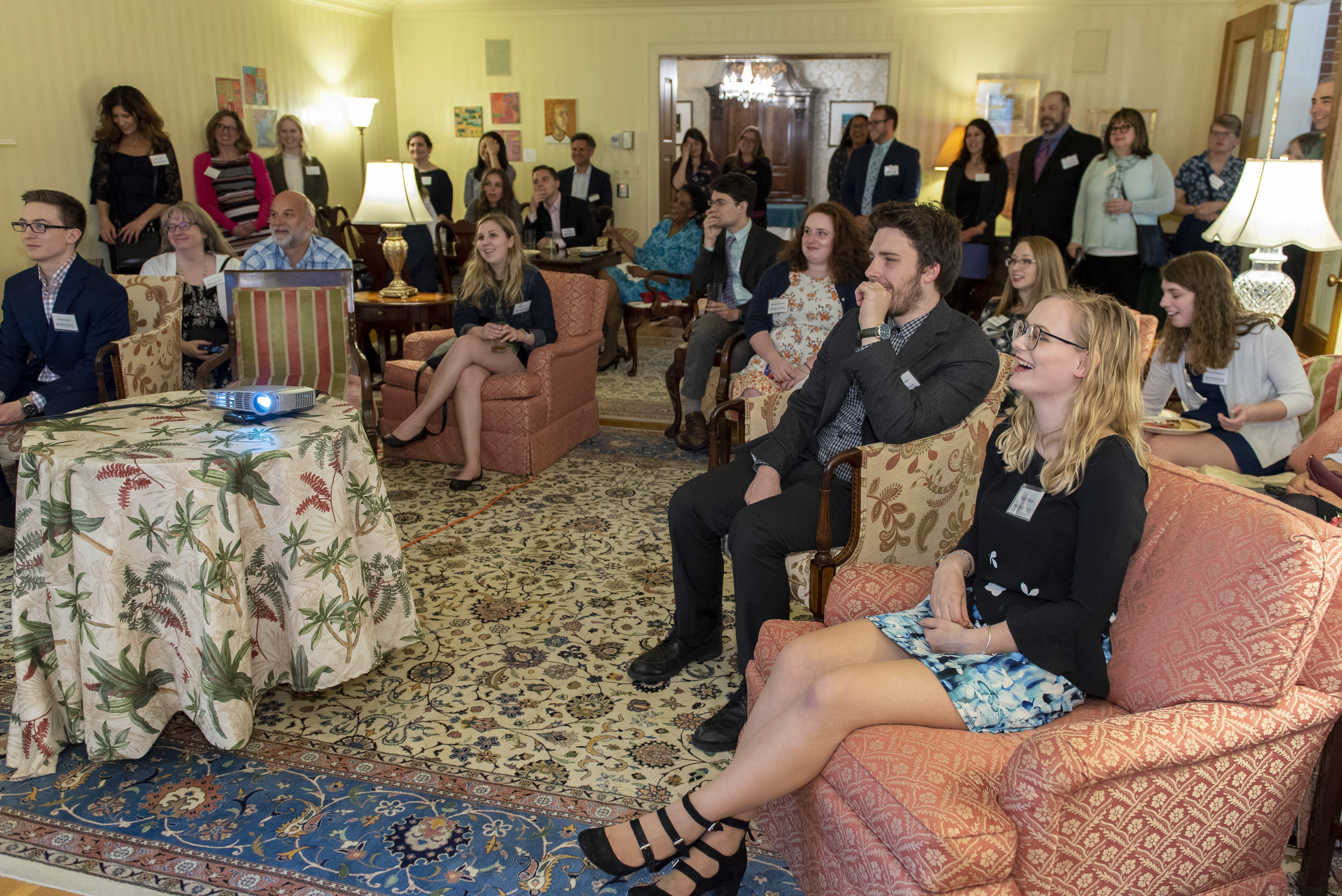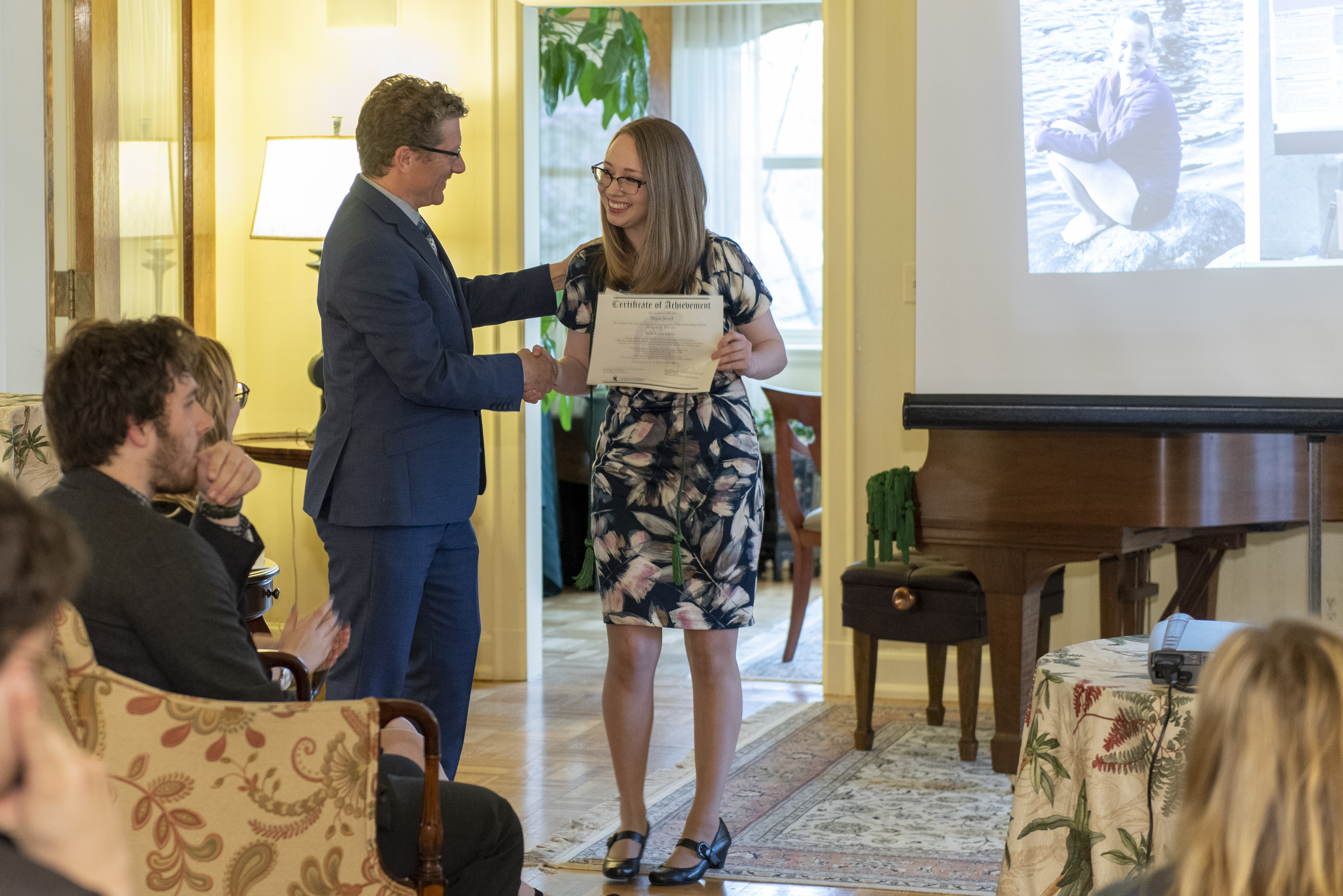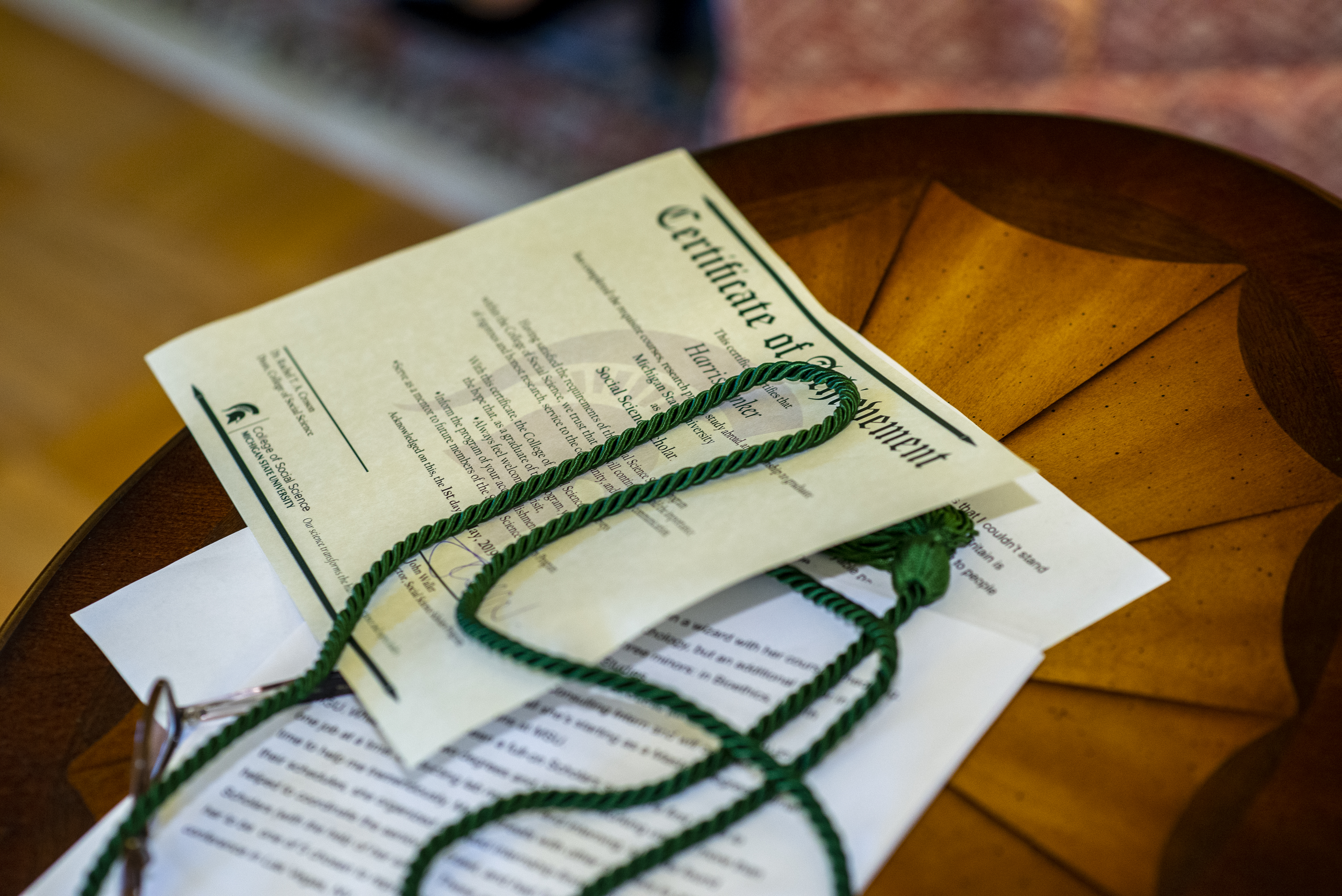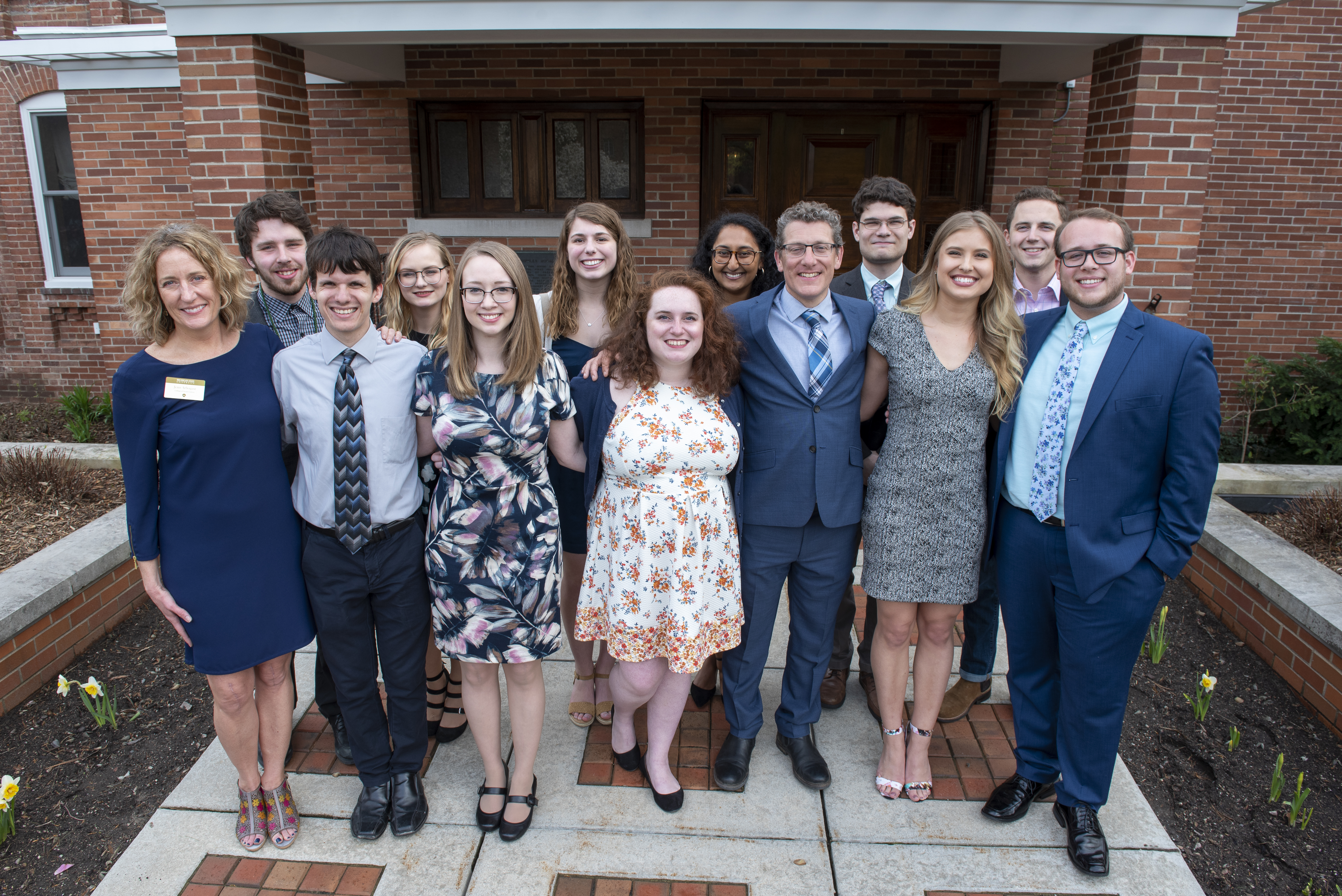September 2019
In the past several months, the Scholars program and students have flourished. In late spring, a bright new cohort of students was introduced to the program, and a group of existing students published their research in the third volume of the Social Science Scholars Research Book. The summer months brought dozens of internship opportunities and the freshman year cohort spent a month in England. Read all about these experiences below!
A Message From Dr. Waller
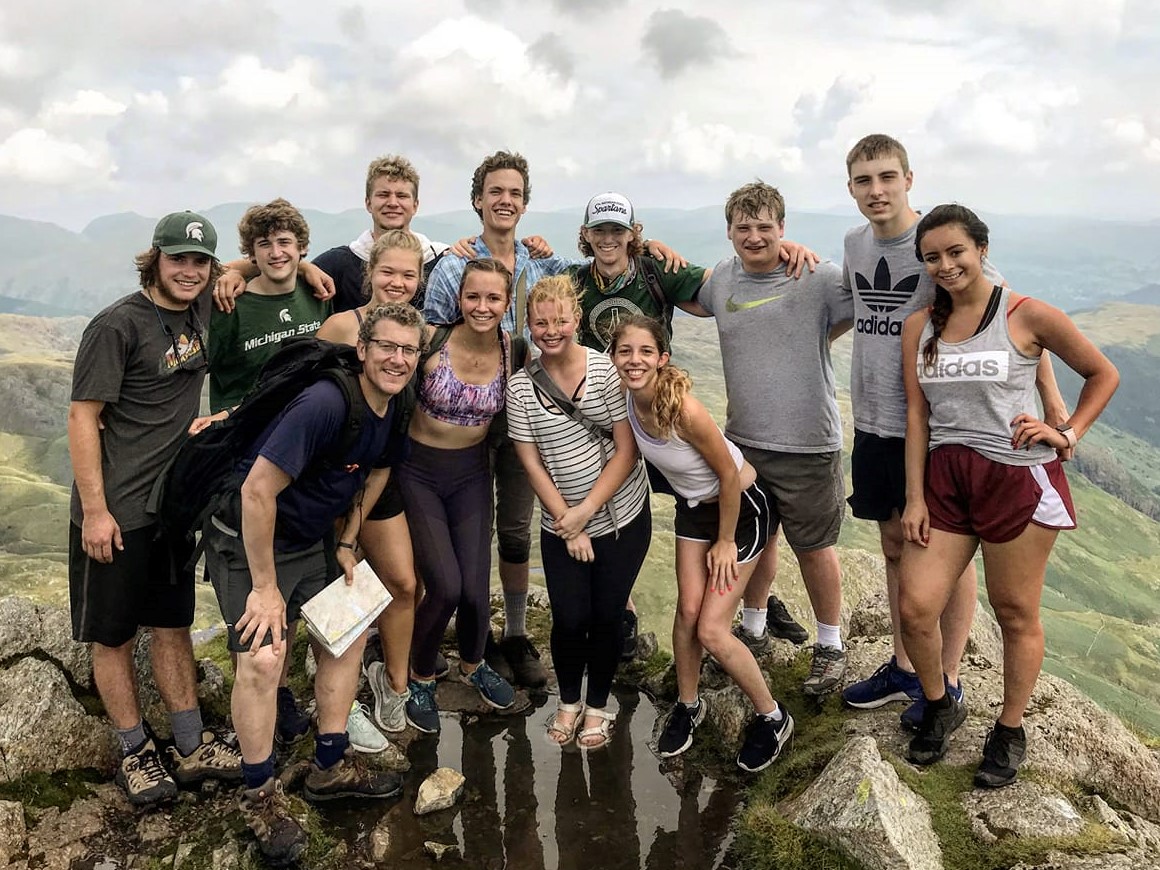 After a productive year in the UK, I’m thrilled to be back in Berkey Hall to greet our sixth cohort of Social Science Scholars! I spent my final three and a half weeks in England taking our rising sophomores on a trip to London, Oxford and the Lake District. They were a delight to travel with – I was especially pleased by the quality of the questions they asked our guest lecturers, who included experts on climate change and the ‘anthropocene’, Brexit, a leading UK novelist, and the chief legal counsel to Oxfam. The feedback I received from these speakers was very gratifying; here are some examples: ‘what a smart group, such a pleasure to speak to them’, ‘that’s an incredibly bright bunch, thanks for the opportunity’, and ‘I loved meeting the students and it was a hugely interesting session’. The Scholars also showed plenty of stamina as we lugged our bags across the country, including one journey which involved a long walk, followed by three trains and two buses, and reaching our destination in a remote, mountainous valley after about nine hours of travel. But the views, like this one captured by Ren Mueller, made it all worthwhile.
After a productive year in the UK, I’m thrilled to be back in Berkey Hall to greet our sixth cohort of Social Science Scholars! I spent my final three and a half weeks in England taking our rising sophomores on a trip to London, Oxford and the Lake District. They were a delight to travel with – I was especially pleased by the quality of the questions they asked our guest lecturers, who included experts on climate change and the ‘anthropocene’, Brexit, a leading UK novelist, and the chief legal counsel to Oxfam. The feedback I received from these speakers was very gratifying; here are some examples: ‘what a smart group, such a pleasure to speak to them’, ‘that’s an incredibly bright bunch, thanks for the opportunity’, and ‘I loved meeting the students and it was a hugely interesting session’. The Scholars also showed plenty of stamina as we lugged our bags across the country, including one journey which involved a long walk, followed by three trains and two buses, and reaching our destination in a remote, mountainous valley after about nine hours of travel. But the views, like this one captured by Ren Mueller, made it all worthwhile.
Directing the Scholars Program has been the greatest pleasure of my teaching career and seeing our Scholars graduate is a particular joy. That’s why I returned for a short, surprise visit in May to see our second cohort don their green gowns and mortar boards and step into the next phases of their lives. The highlight was the annual celebration of the Scholars’ achievements in Cowles House where we recognize and remind ourselves of what spectacular students we have the pleasure to teach. Thank you to Dean Rachel Croson for allowing us to hold this always heartwarming event.
At the end of August, the sixth cohort moved into their dorms and I’m excited to get to know this group which Jenn Arbogast and Dr. Mickey Stamm, the interim director, recruited in the spring. Of the twenty-one new Scholars, sixteen are new to the university and an extraordinary eight are from out of state. As you’ll see from their online bios, this is a highly talented collection of students. Now, speaking of Jenn and Dr. Stamm, I’d like to applaud what a fabulous job they’ve done over the last year. Jenn brought to the task her usual efficiency and compassion. Her dedication to student welfare was fittingly recognized this year with a ‘Spirit of Ability Award’, an honor conferred annually on someone at MSU who has made a substantial difference in ‘making MSU a more inclusive place.’ We were also very fortunate last year to be able to call on Dr. Stamm’s skill as a teacher. It was clear from the enthusiasm of the students I saw in the UK that they had deeply appreciated his intelligence and accessibility – as well as his staggering knowledge about every conceivable genre of music. Dr. Stamm will be returning to the History Department this fall, to embark on his next book project, but he’ll always be welcome in Room 307.
Lastly, I’d like to mention a couple of changes to the Scholars Program. I’ve felt strongly for some time that the students should be exposed to varied faculty who can impart knowledge from disciplines different to my own. To this end, earlier this year we conducted a search for faculty willing to teach the Scholars. From a strikingly impressive pool, we selected two and they both gladly accepted. First, Dr. Heather McCauley, an Assistant Professor in the School of Social Work, who received a PhD from Harvard University and came to MSU four years ago from the University of Pittsburgh School of Medicine. Heather is an expert in fields ranging from global health and intimate partner violence to sex trafficking. Second, Dr. Brendan Mullen of the Department of Sociology, who holds a PhD from the University of Pennsylvania and whose distinguished career has combined an impressive amount of published scholarship with administrative and consultancy positions, from serving as an Associate Dean in this College to advising the World Health Organization and the United Nations Economic Commission for Europe. The addition of Dr. McCauley and Dr. Mullen to the program means that we can offer Scholars a really broad range of experience and expertise.
In short, the Scholars Program is going strong. Quite apart from their success in class, our students are going on to impressive careers or graduate programs and completing excellent summer internships. Many owe their achievements off campus to the support and enthusiasm of alumni and community mentors. So, if you would like to get involved, whether that means coming in to address a class or mentoring an individual student, please do get in touch. Giving our Scholars the best start to their lives after graduation is very much a group effort and we’d be thrilled to have your participation.
Study Abroad 2019 Photo Series

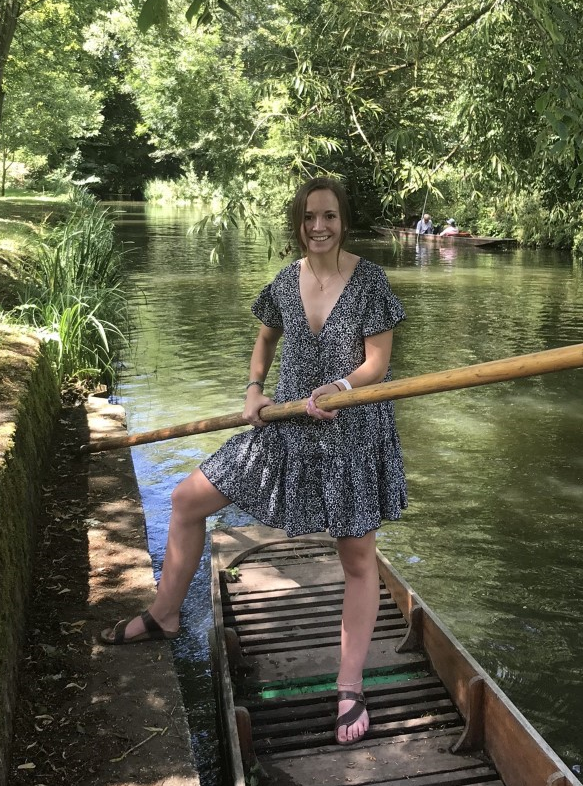
[Left] Students pose after seeing a Shakespeare play at the Globe Theatre. [Right] Scholar Carleigh punts on the river in Oxford.
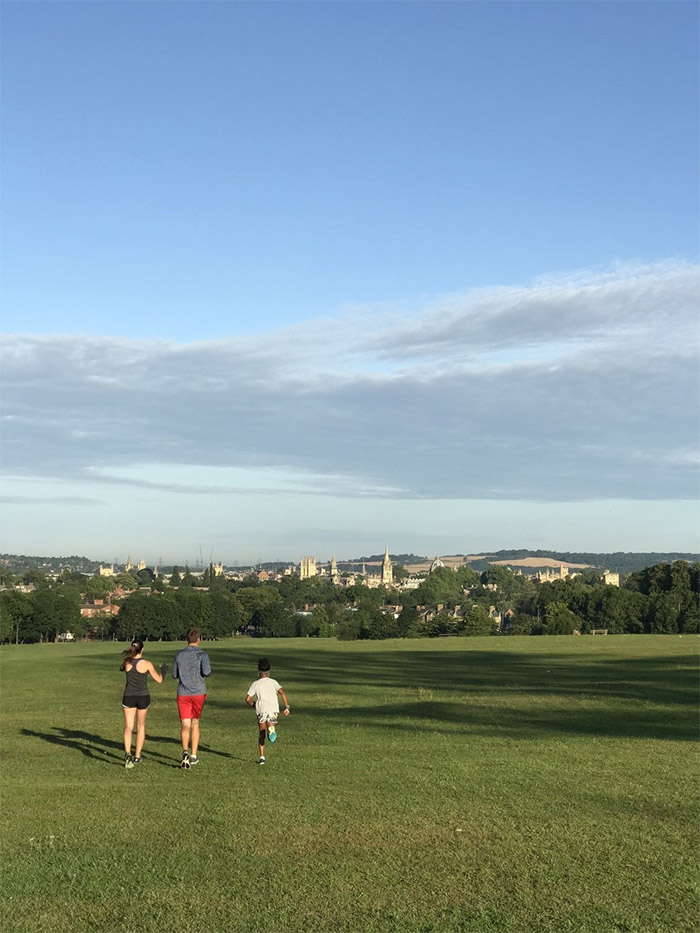
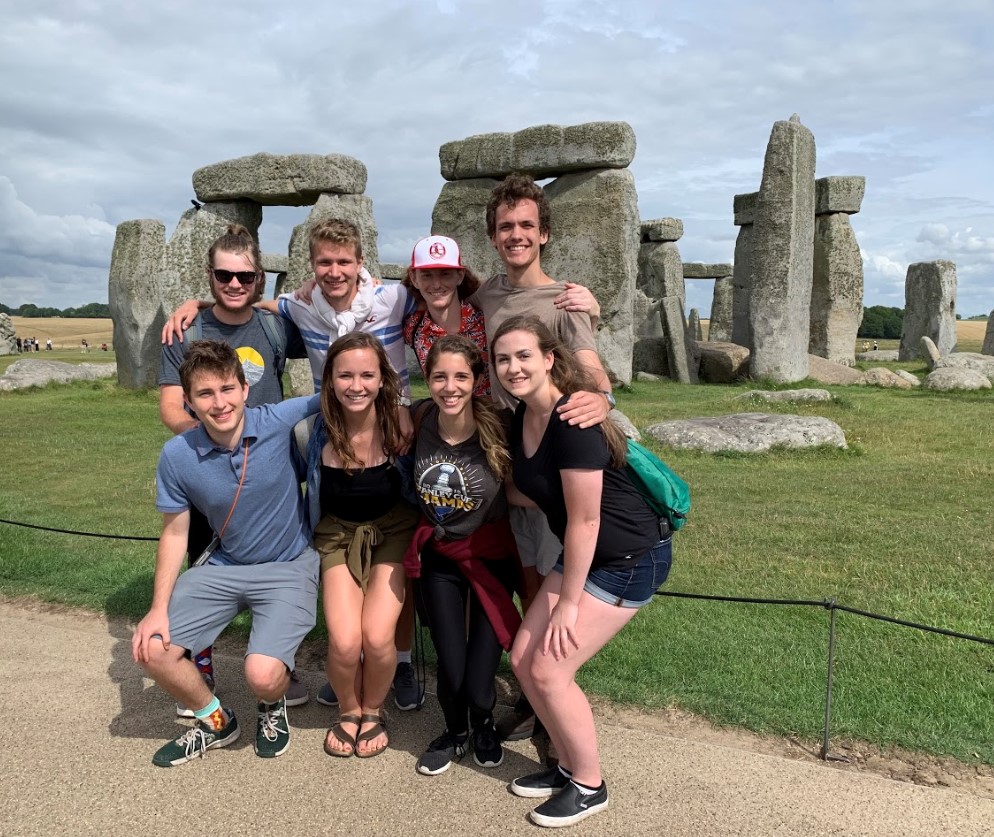
[Left] Morning run through a field in Oxford. [Right] Group of students pose in front of Stonehenge during weekend trip to Wiltshire.
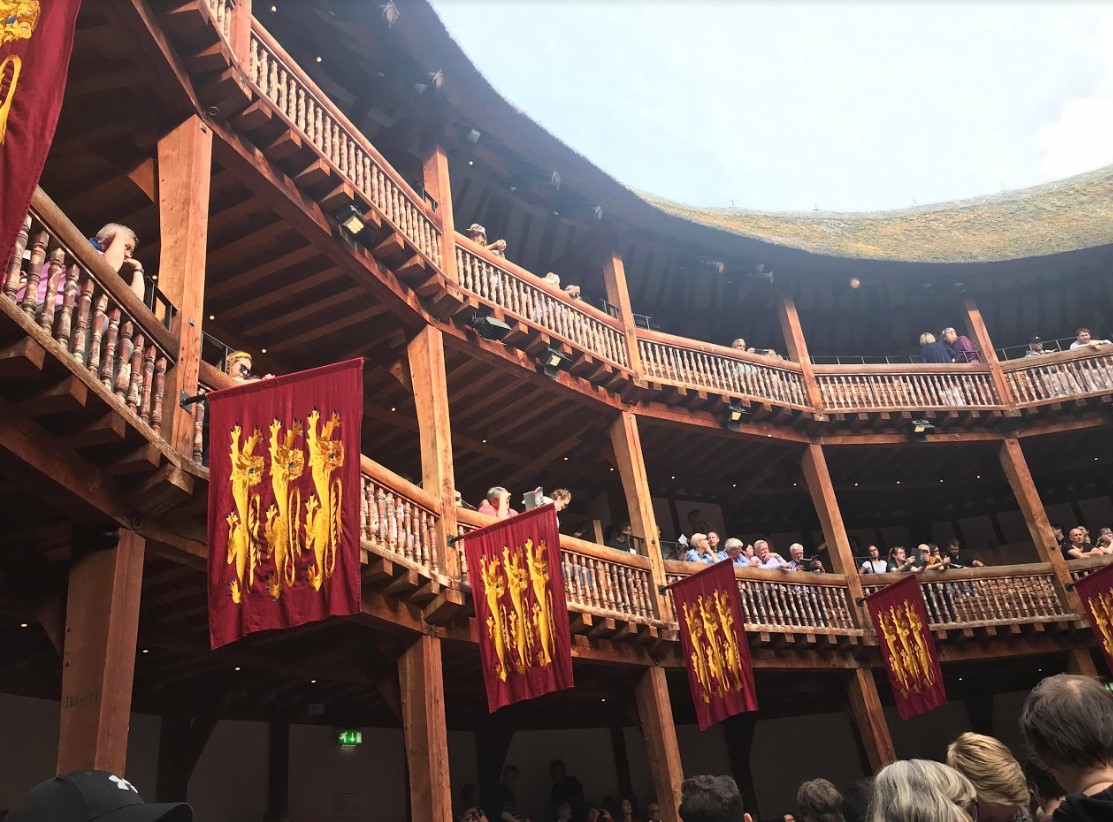
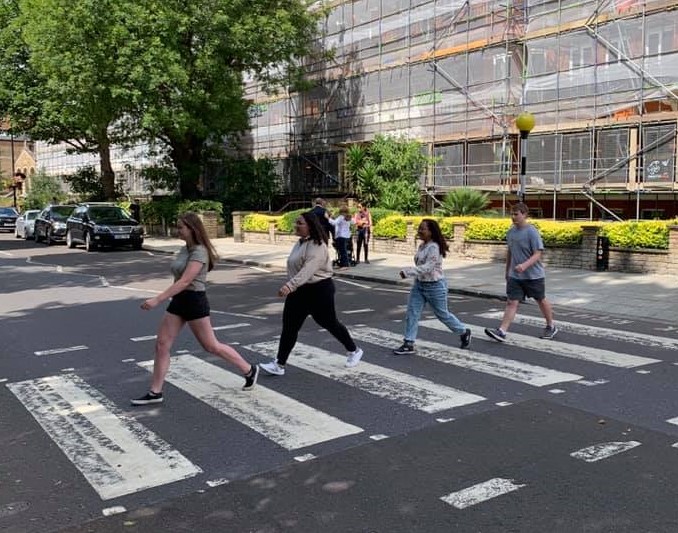
[Left] A visit to the Globe Theatre. [Right] Four Scholars stroll down the iconic Abbey Road.
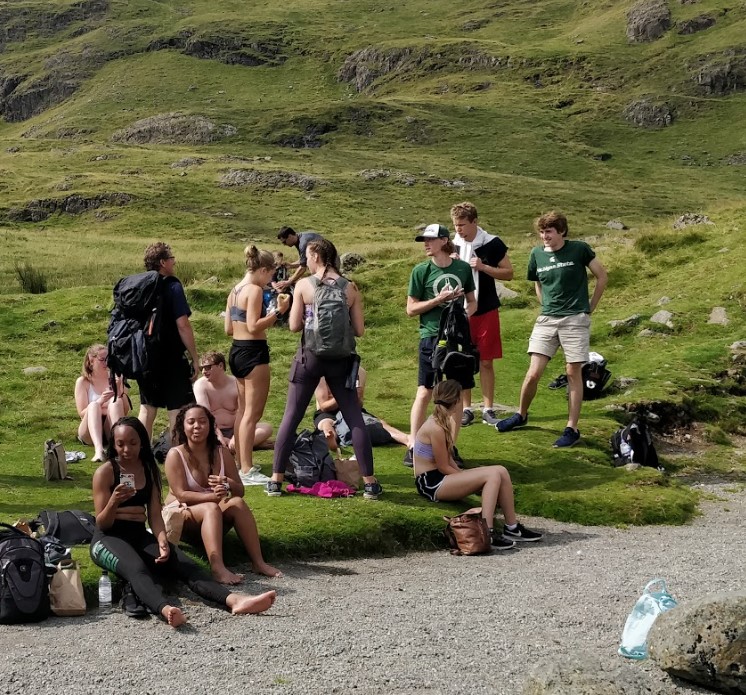
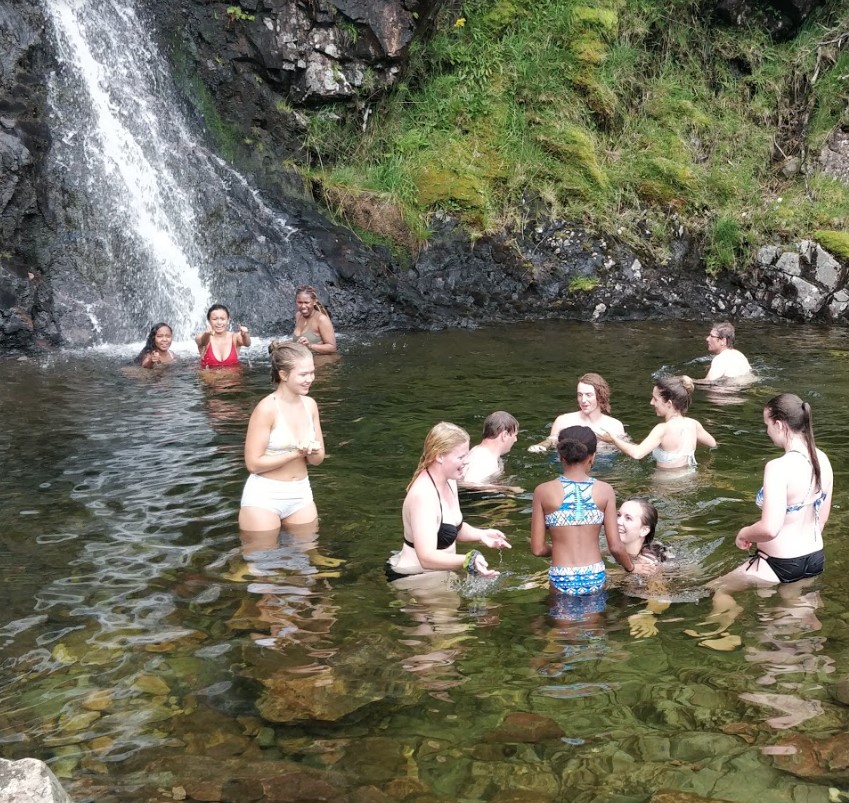
Taking a break from hiking to relax by a waterfall in the Lake District.
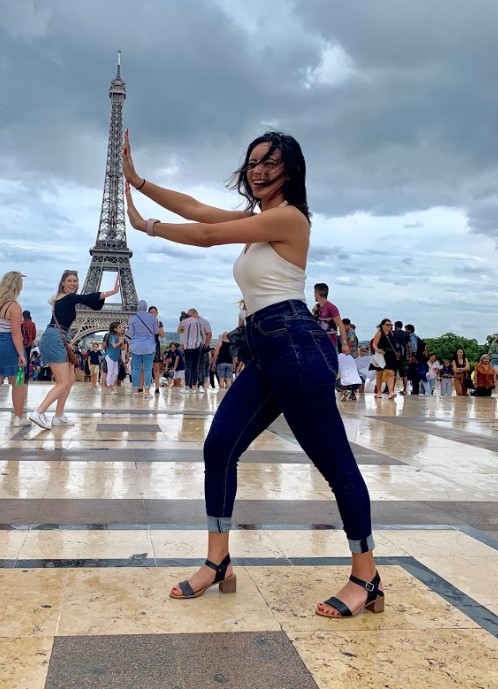
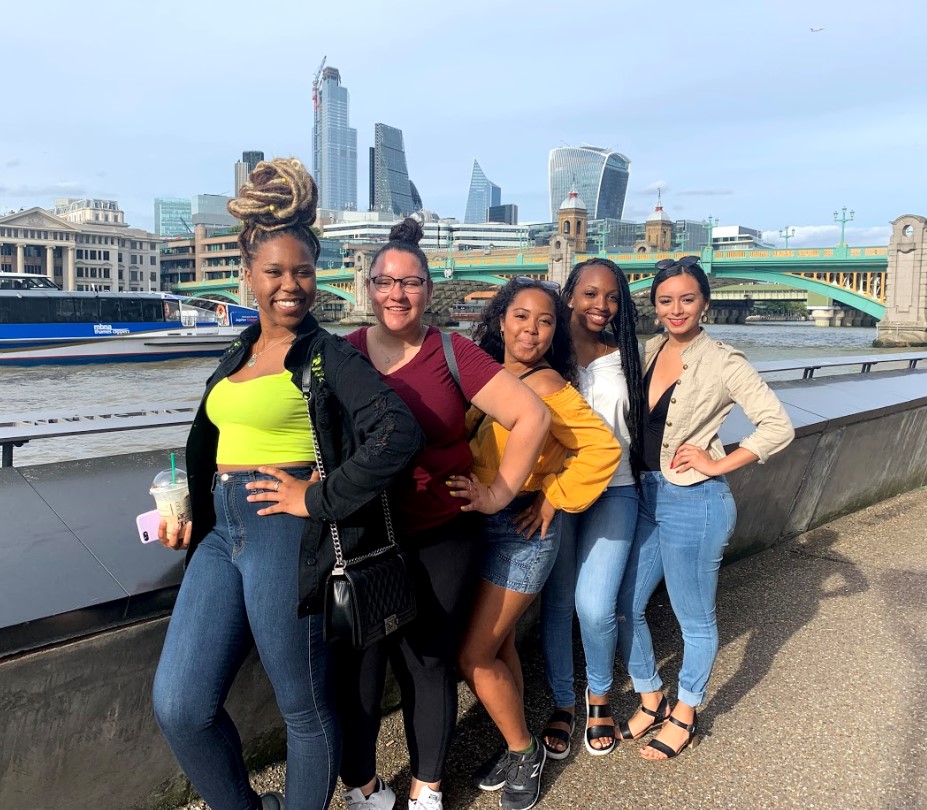
[Left] Scholar Janet poses with the Eiffel Tower during a weekend trip to Paris. [Right] Scholars Wisdom, Gracie, Erykah, Deandra, and Janet stop for a photo by the bank of the River Thames.
Emily Saxon - Research Feature
Emily poses with Award presented to her during the University Research Showcase for her work.
Over the past year, Scholar Emily Saxon has spent time researching the differences among universities' sexual assault prevention programs. We interviewed Emily about her research experience, findings, and more.
Q: What is your research topic / what comprises your paper?
A. My research paper compared the sexual misconduct prevention policies at nine different colleges within the Association of American Universities. I presented statistics about sexual misconduct on college campuses to help readers understand the high prevalence and seriousness of the issues. I also gave readers background on the history of federal laws regarding sexual misconduct that universities must adhere to. After that, the bulk of my paper consisted of interviews I conducted with a representative from each of the nine universities. I created a list of survey questions, asking each school about the methods they use to teach students about preventing sexual misconduct, how many staff members work specifically on the prevention of sexual misconduct, about funding for prevention programming, and more.
Q: How did you come to choose this topic?
A. I chose this topic because I have always felt immense empathy for its victim. I was also really motivated by the closeness of the problem to our own campus because, at the time I started the research, Larry Nassar was being brought to trial. As I worked on the paper, it only became more timely as the MeToo movement and public dialogues about sexual misconduct gained momentum.
Q: Can you recall a time you felt most fulfilled in your research process?
A. I began to feel like my research was actually meaningful when I finally began interviewing the schools. Once I had interviewed about half of them, I was mentally comparing them, and I could already draw loose comparisons between the strength of prevention efforts from one school to another. To me, this meant that once I shared my findings with each of the schools I interviewed, it would hopefully inspire the schools to make improvements to their prevention measures, based on what they saw other schools were doing.
Q: In your opinion, what was the most significant or important piece of information you obtained from your research?
A. I believe one of the most important take-aways from my paper was disappointing from a moral sense. Money is a major factor in the strength of a university’s prevention measures. It takes a significant amount of money to create strong prevention efforts, so a lot of colleges don’t seem to prioritize it, but as evidenced in my interviews, it is doable, even for large universities. Unfortunately, it seems that scandals can be the real “kick” for a school to pour more money into prevention. Take MSU for example; we used to have a pretty average prevention program, but after being rocked by the atrocities of Larry Nassar, the school leadership decided it was finally worthwhile to invest in prevention. We now have arguably the best prevention efforts out of all schools I interviewed. But it shouldn’t take a tragedy for a school’s culture to change. That’s the sad part.
2019 Cohort
The program welcomed 21 bright new students this year ranging in interests and majors. Learn their names and majors below!
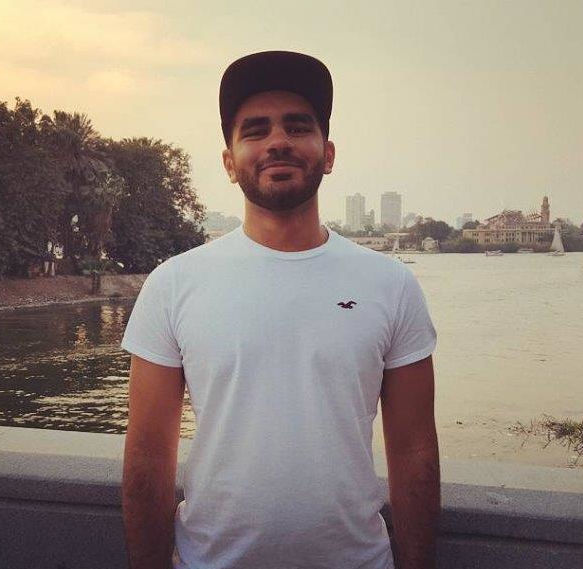
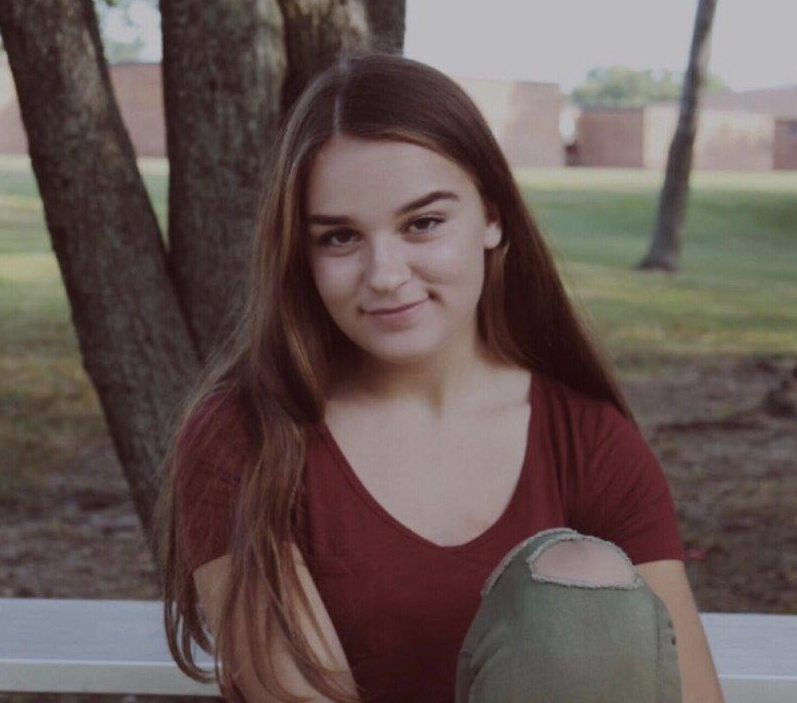
[Left to right] Ahmed Tawakol (Economics), Carrie Nielsen (Sociology), Isabella Henneman (Psychology).
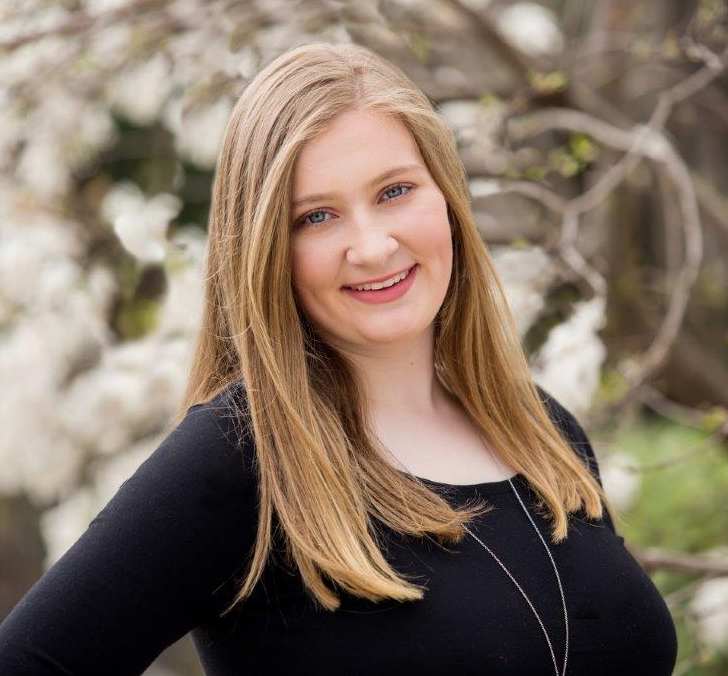
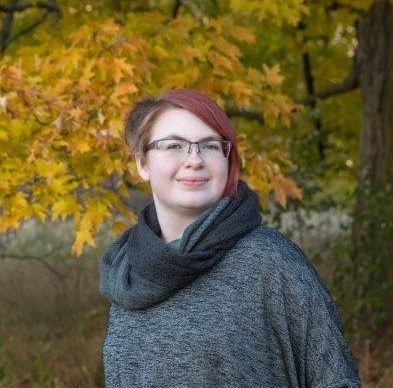
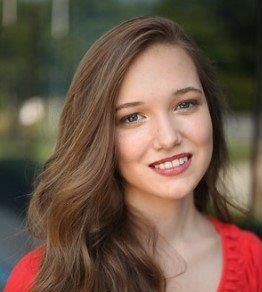
[Left to right] Caitlin Patton (Psychology), Caitlin Sivak (Urban and Regional Planning), Grace Rathburn (Political Science/Pre Law).
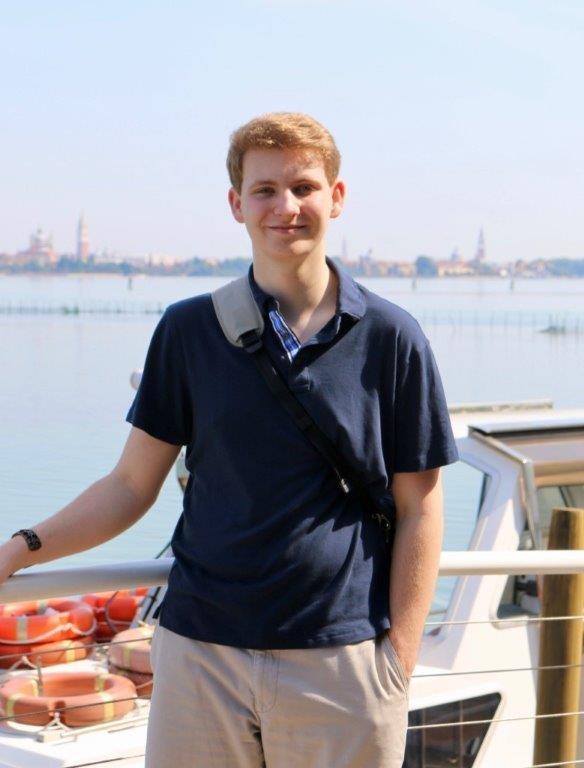
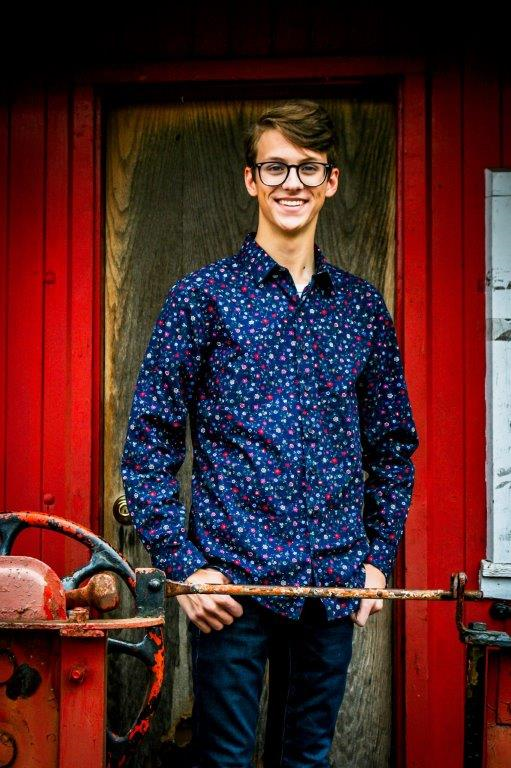

[Left to right] Chris Eyke (James Madison/Economics), Evan Coberly (History Education), Faith Foster (Psychology).
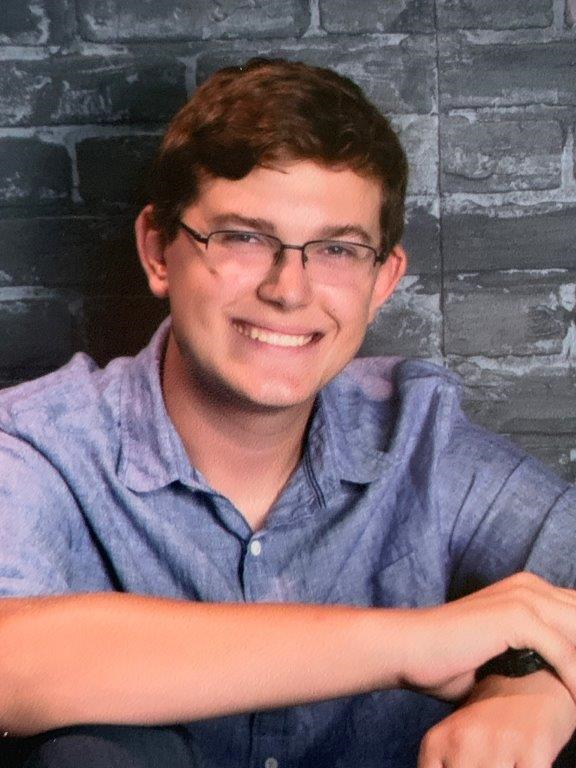
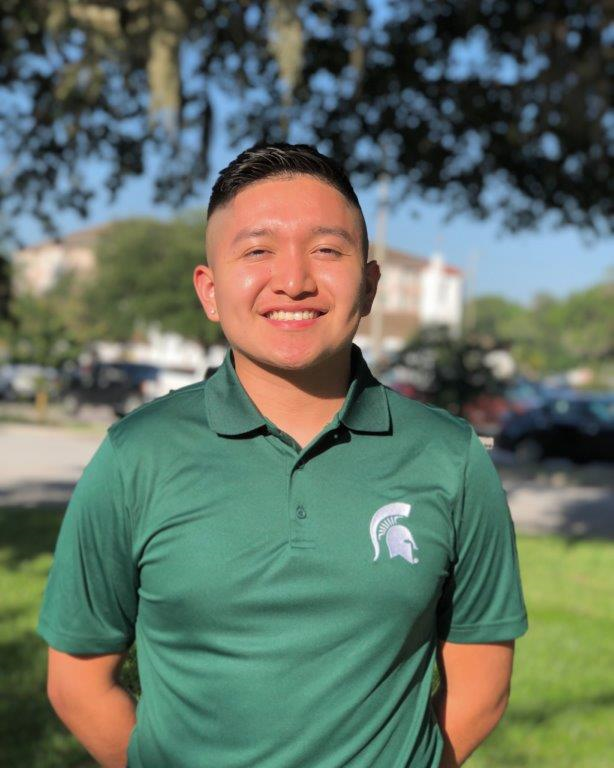
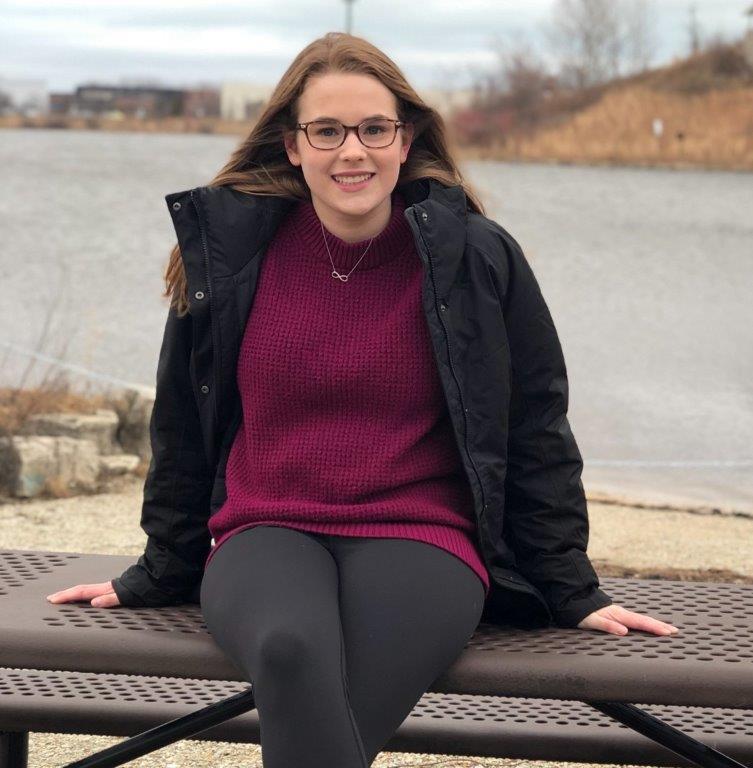
[Left to right] Konstanine Wade (Economics), Juan Vazquez (Psychology), Katie Frieden (Psychology).
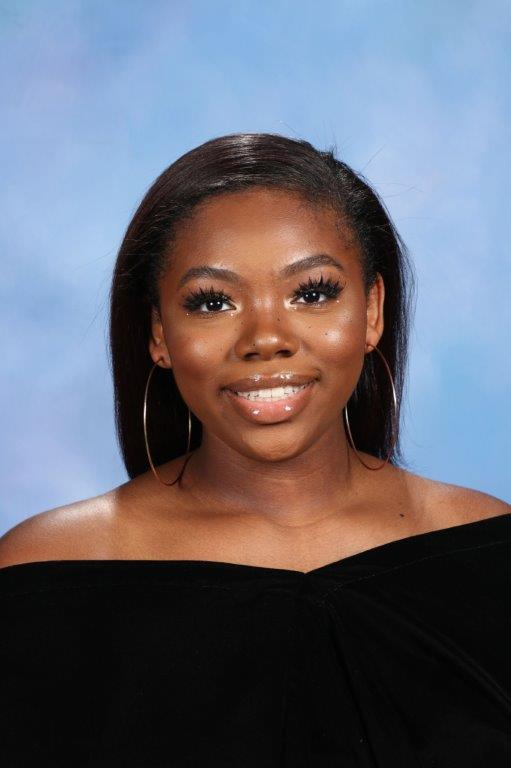

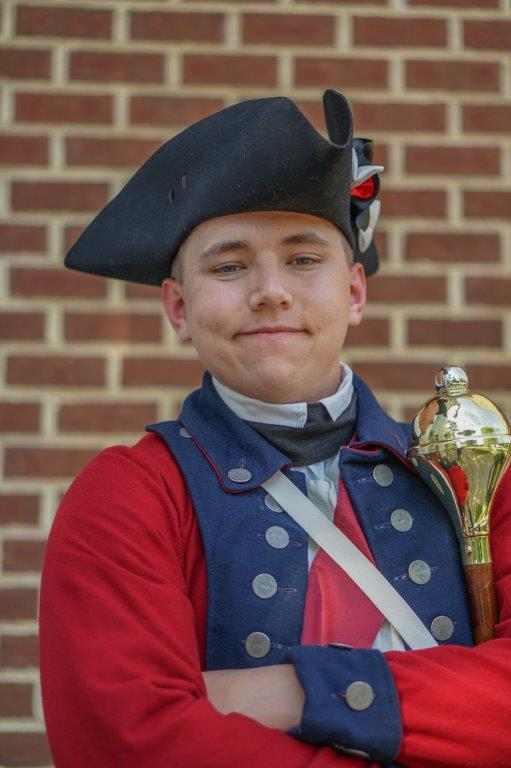
[Left to right] Kendal Vassar (Political Science/Pre Law), Renee Torres (Psychology), Macken Keefe (Political Science).
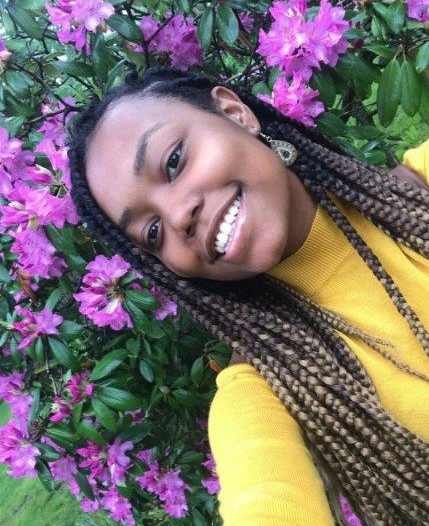
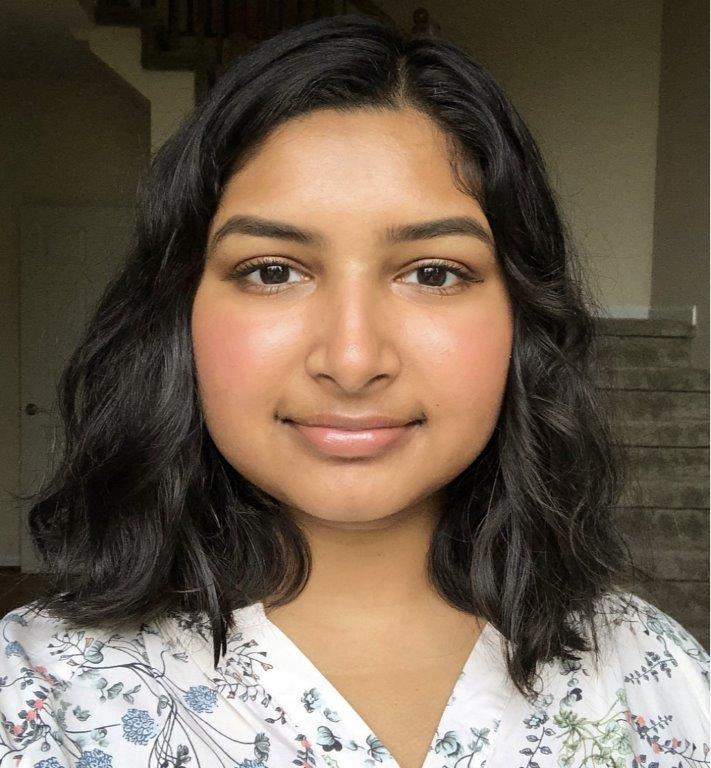
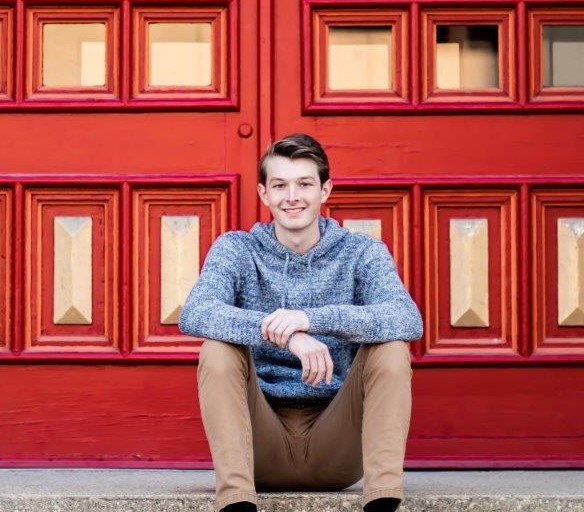
[Left to right] Nya Todd (Comparative Studies and Politics), Ovya Venkat (Psychology/Environmental Studies and Sustainability), Thomas Crain (History).

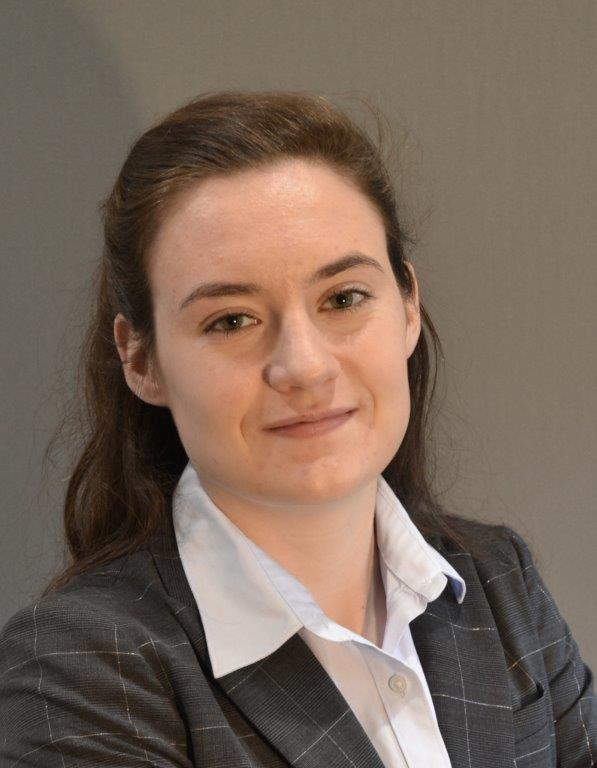
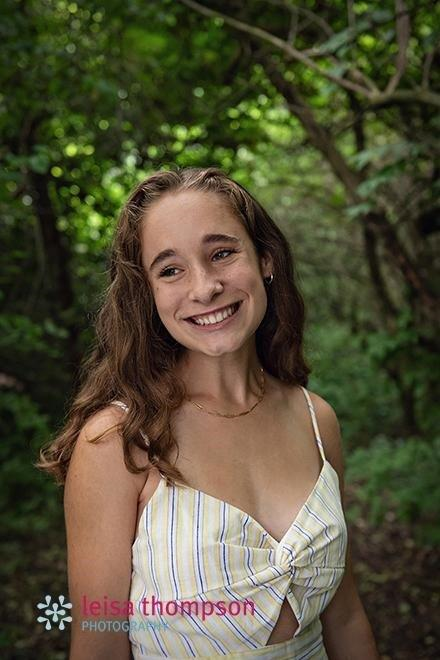
[Left to right] Sabrina Hall (Political Science), Sophie Alegi (History), Stella Weinberg (Psychology).
Social Science Scholars Inagural Book Launch
On April 25, the Social Science Scholars Program showcased The Third Volume of Social Science Scholars Research with its inaugural book launch.
Scholars have the extraordinary opportunity to be published during their time in the program. Each Scholar picks a topic and, working individually or with a small group, completes an academic, peer-reviewed research article. This process is long and arduous, taking students about two years and several drafts to complete. Approved articles are included in the annual edition of the Social Science Scholars Research book.
Research is an integral component of the Scholars program, challenging students to write professional-level, academic research papers and rewarding them with the prospect of publication. To be published as an undergrad is a highly impressive feat.
“It’s really exciting to see that other people are interested in the same kinds of things that you’re interested in and see how all the work you put in is actually going to impact the world,” said junior Scholar Nicole Jedding.
Junior Scholar Charlie Booher added, “I’m really excited to see this work come into fruition, and I’m really proud that it can be a part of the Social Science Scholars Collection.”
Chairperson of the Social Science Alumni Leadership Council, Jennifer Shimp, and Senior Associate Dean of Faculty Affairs, Joe Messina welcomed attendees and introduced the Scholars and their work. Four Scholars then gave short speeches about their research that is featured in this year’s volume. Other Scholars also displayed their research posters, allowing attendees to see the wide range of topics Scholars cover and the depth of work that goes into each project.
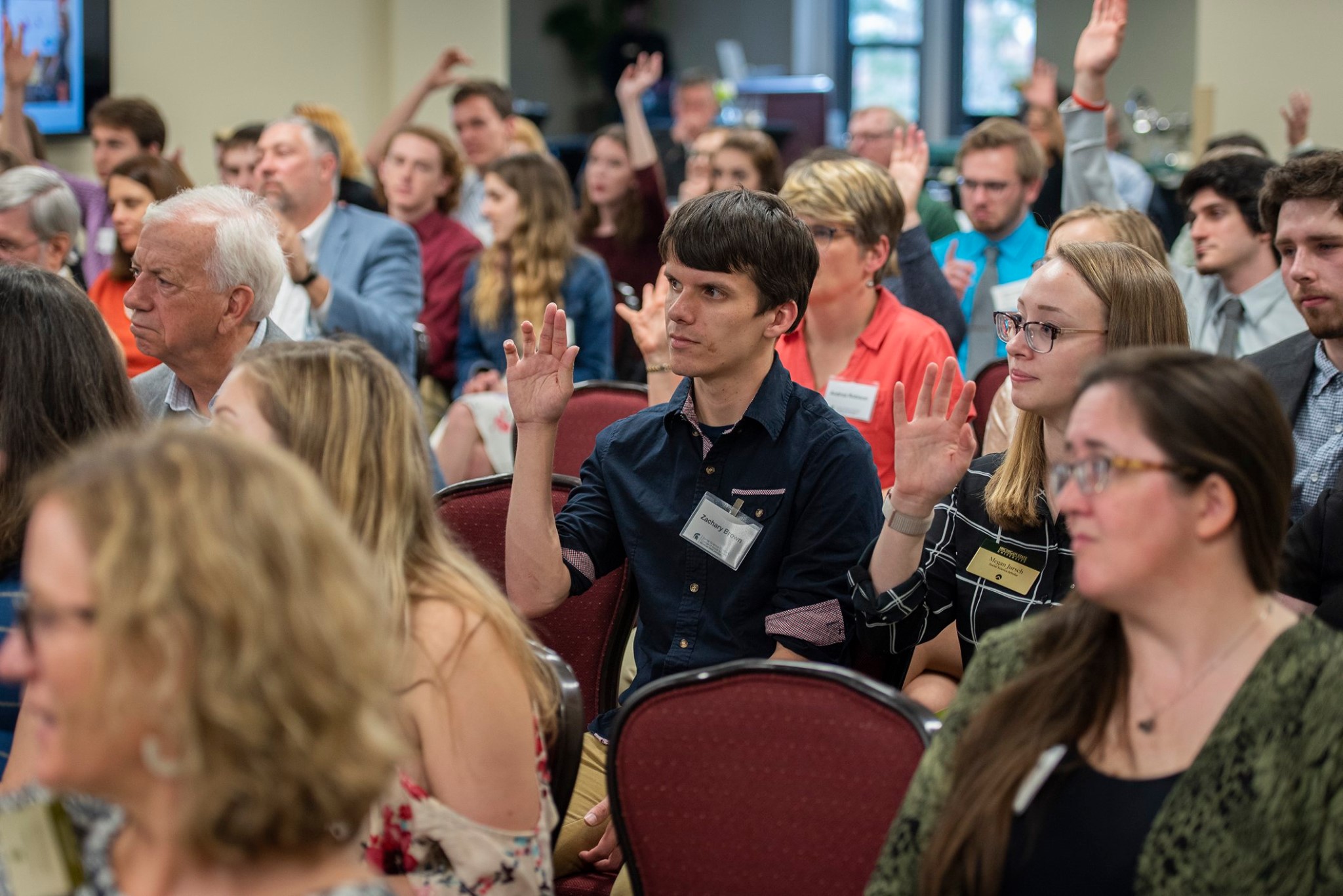
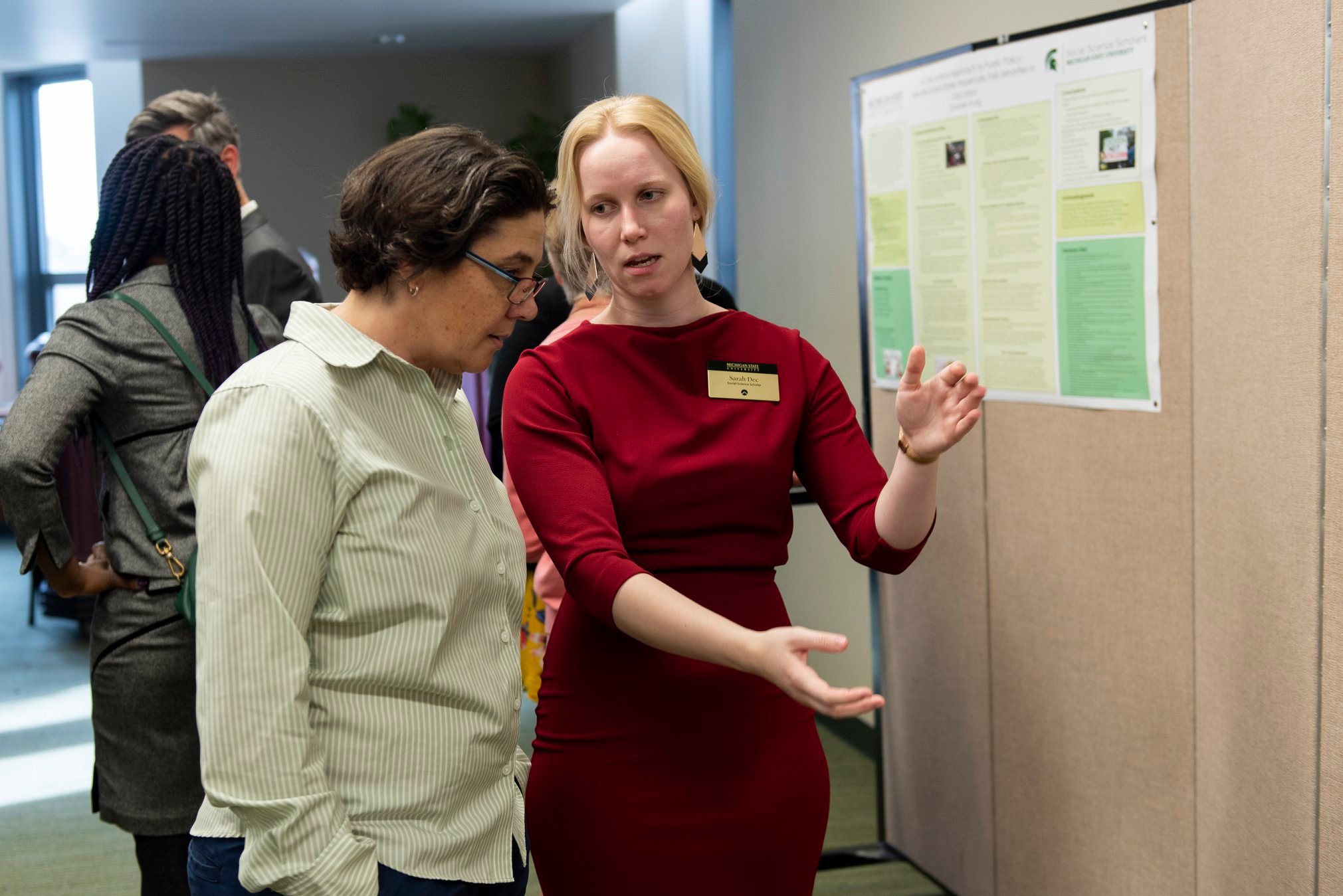
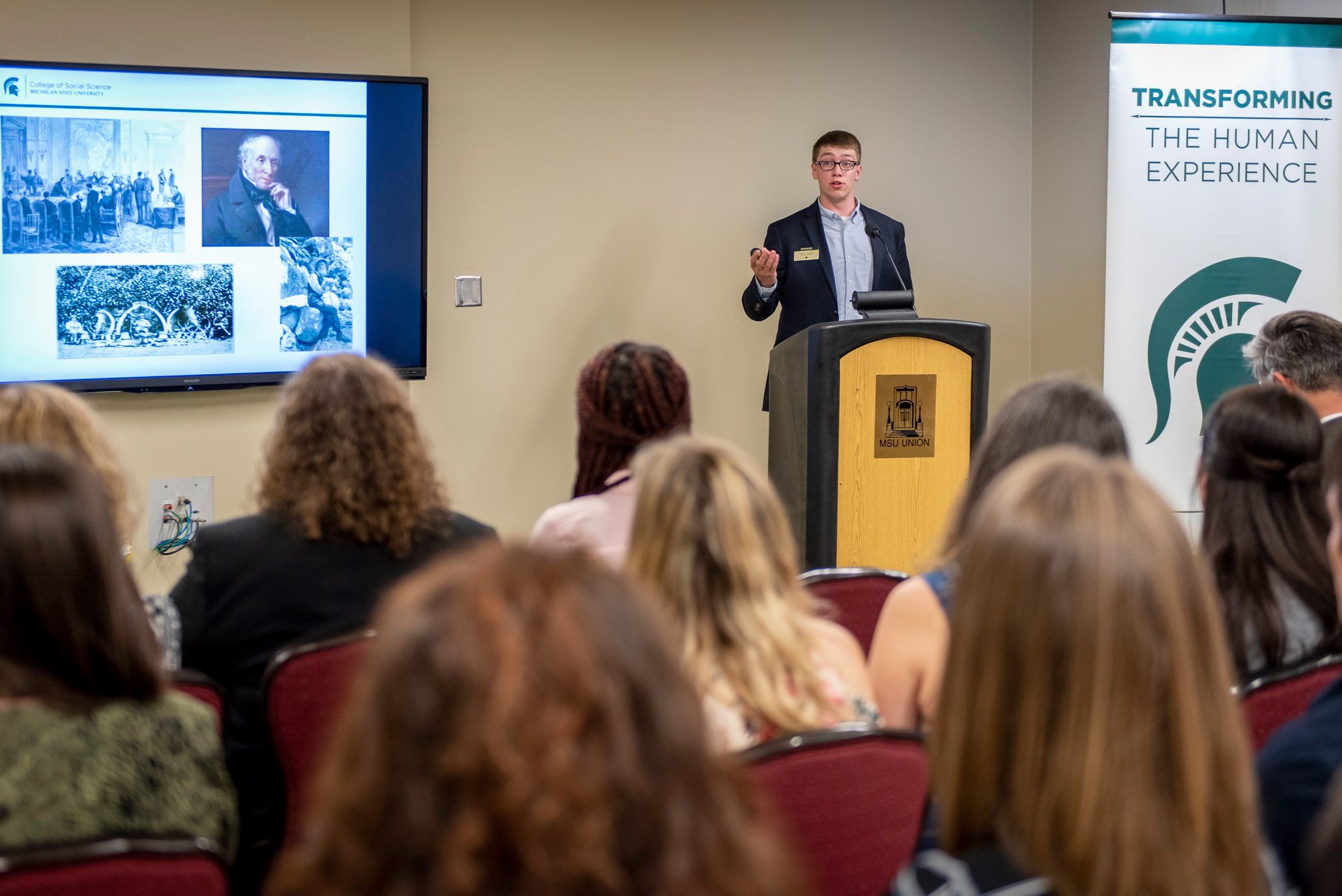
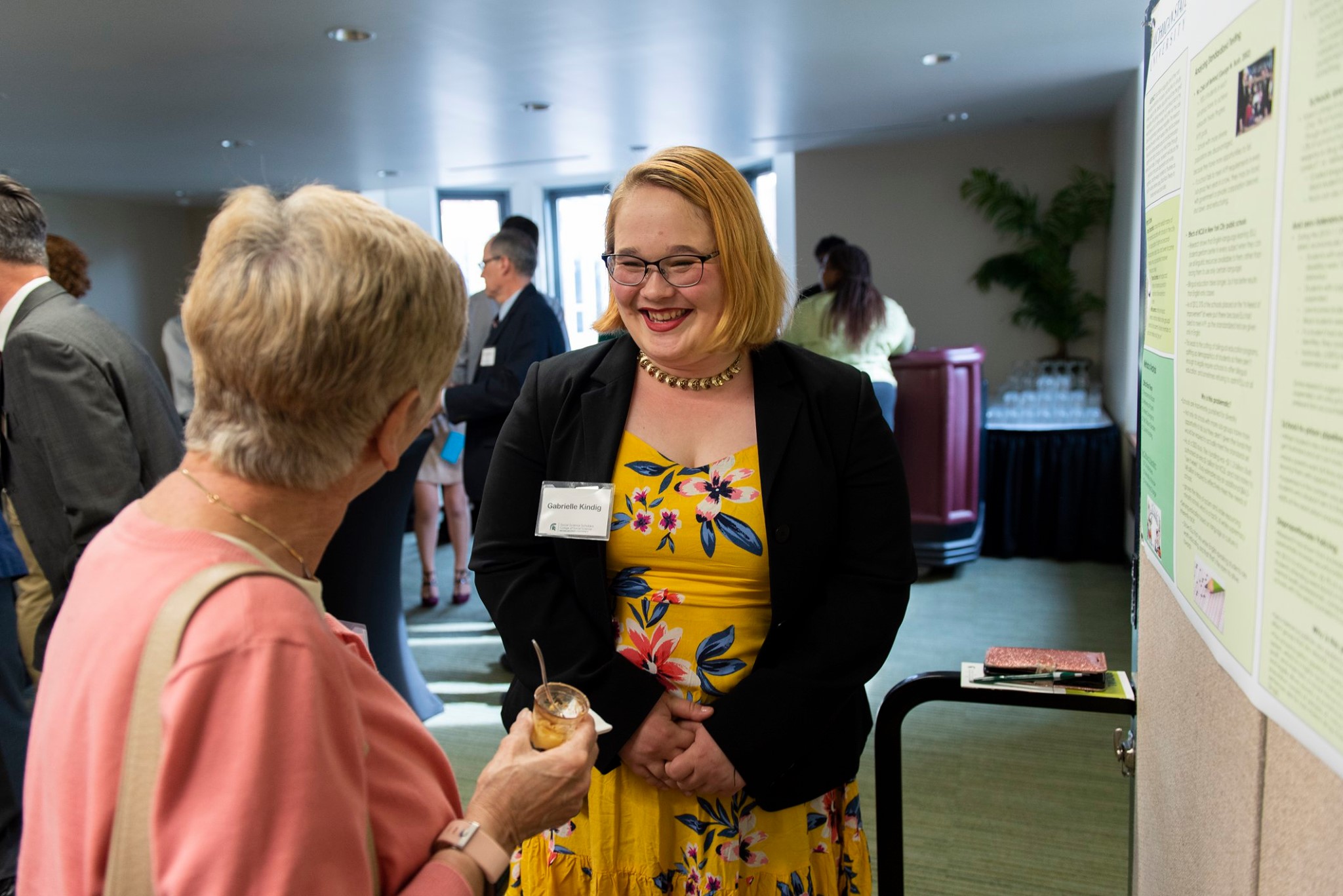
Research of each student speaker is featured below:
Andrew Rockett: Uganda in World War II: The End of a Protectorate - My research analyzes the factors responsible for the seemingly rapid deterioration of the Ugandan Protectorate during World War II. Many issues such as divisions among ethnic groups, political neglect, and the war’s stress on resources all played roles in growing dissent among Ugandans. My chapter extensively considers literature on the subject while also integrating some primary sources from the era.
Nicole Jedding: Covering the United States’ Drug Users: From Criminals to Victims - My research quantitatively analyzed the media's portrayal of crack-cocaine users in the 1980s as well as opioid misusers in present-day coverage and coded for a number of variables—notably demographic features of the portrayed users and the general framing of the story. It sought to find evidence for the common perception that the latter population has elicited a sympathetic public response and the former has not, as well as identifying how that relates to other factors like discussion about treatment and criminal justice alternatives.
Charlie Booher: The Effects Of Colonial Sentiments Regarding Nature - My work deals with the historical, and oftentimes dark, roots of conservation efforts in a region with some of the highest biodiversity on the planet. The Maasai Steppe region of Tanzania is home to some of the world’s most charismatic species of wildlife, but the institutions that have been established to manage these resources are a product of the colonial era, which causes a variety of issues for the humans and wildlife that occupy this landscape.
Jasmine Jordan: Alienation and Isolation of Minority Students: Housing Segregation at MSU - My project researches whether there is a disproportionate number of Black and LatinX students in specific dorms, what effects feelings of alienation and isolation can have on minority students, and what other universities have done to positively reduce feelings of isolation.
The first Scholar’s Book Launch was a part of the MSU College of Social Science’s 2nd Annual Social Science Week, which is a week-long celebration of the college’s students, faculty, and alumni. Full of events and networking opportunities, it was graciously funded by the Office of Development and Alumni Relations.
Each printed copy of the Social Science Scholars Research book was sold at the Book Launch. Given the event’s success, it will likely be repeated in the future.
You can purchase third volume of “Social Science Scholars Research” on Amazon.
Scholars Continue Edgewood Village Volunteering Tradition
Every fall, incoming Scholars spend one of their first days as college students volunteering at the Edgewood Village Community Center. This marked the sixth year Scholars served the community through gardening and painting, all while getting to know their fellow classmates.
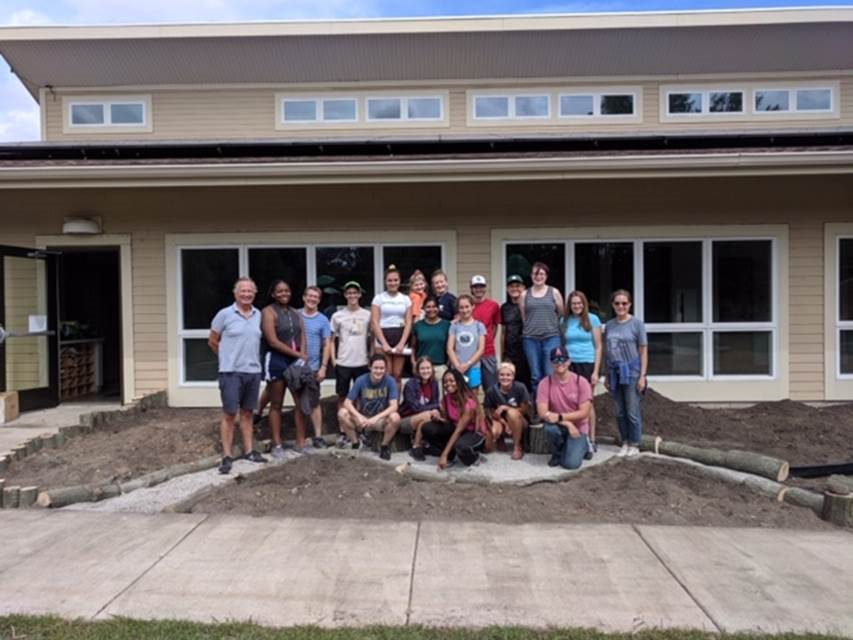
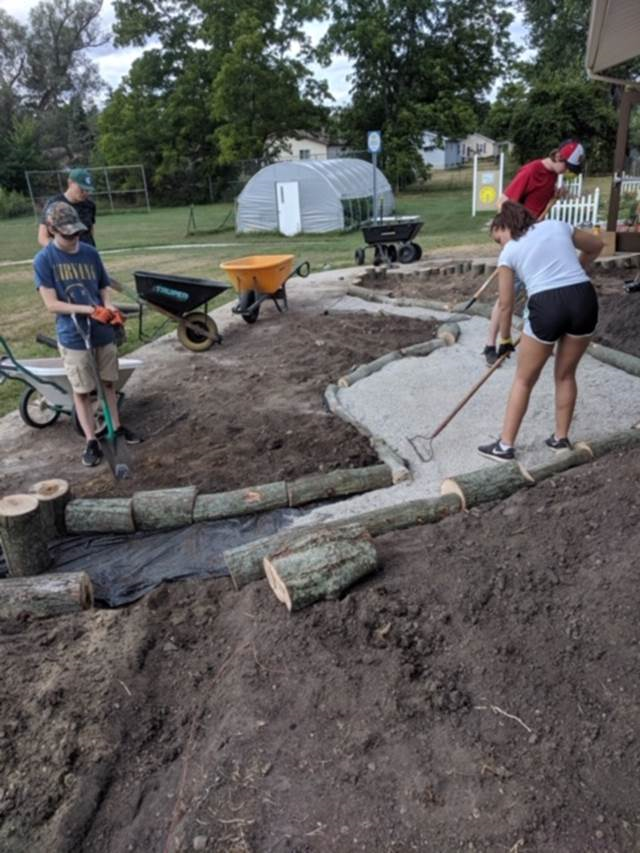
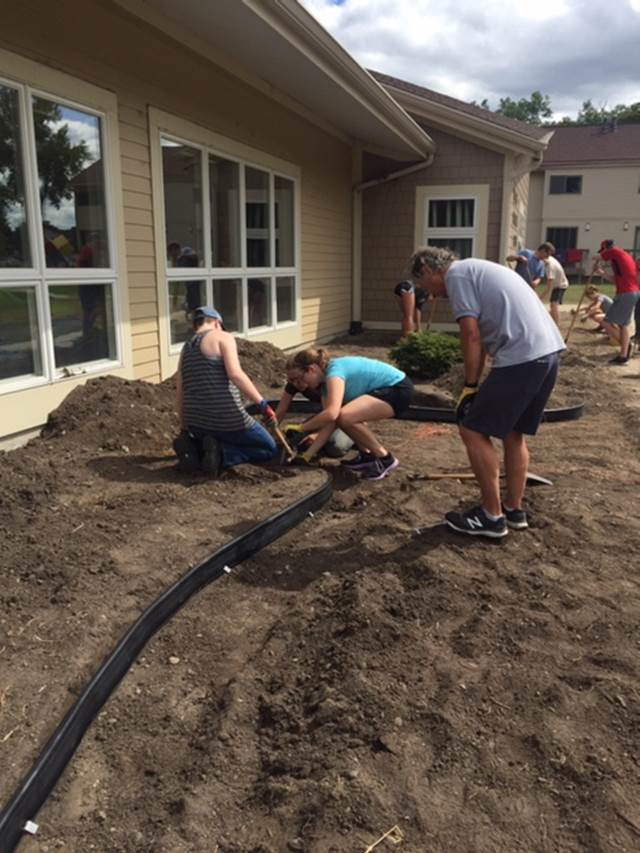
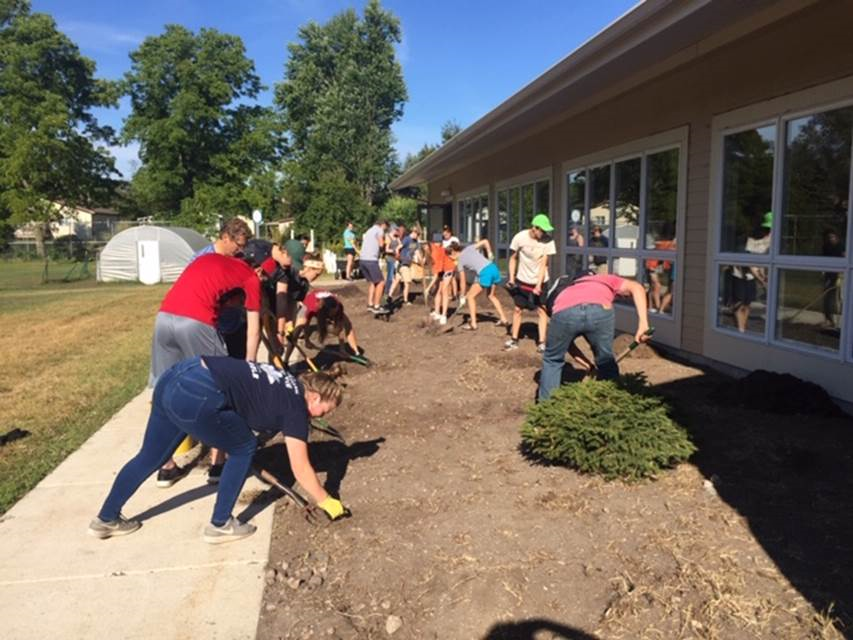
Mentor Highlight - Zoya Shevchenko and Candy Boldrey
By Zoya Shevchenko
The Social Science Scholars Program has provided me with numerous opportunities to meet incredible people - from my fellow Scholars to highly acclaimed academics, the relationships I’ve formed are vast. This being said, the community mentorship program granted me my favorite relationship of all.
I first met Candy during my welcome week at Michigan State at the mentor-mentee pizza party. I rushed into Berkey 307 several minutes late in a sweat, out of breath, ready to make hour-long pleasant small talk with an adult. Scanning the room for a mentor without their mentee, I felt a tap on my shoulder and turned to see a woman smiling widely - “I’ve been looking for a gal with long hair!”
Candy gave a quick introduction and immediately began to ask me about me - my first week, my interests, hobbies, opinions, friends, family - I could hardly get a bite of my pizza before she asked the next question. What I thought would be small talk ended up as an hour-and-a-half long conversation about absolutely everything. Her genuine energy was immediately apparent - I was stunned by her open-mindedness, interest in my life, and willingness to offer advice and insight. I felt as though I’d met my long-lost grandmother.
My freshman year, Candy and I met for coffee or a meal on a semi-regular basis. Often at our favorite spot, Espresso Royale, we would catch up on each other's lives. I would update her on my classes, my research, college experiences, and she would share stories about her kids, grandkids, trips. We would bond over our shared concern for the state of the planet, and manage to laugh about it together. She told me about organizations that aligned with my interests and frequently invited me to educational talks and seminars (often getting “I’m sorry, I’m so busy!” in return, but always understanding).
On several occasions, Candy offered help with my research by connecting me to professors or academics. A friend of hers assisted my research partner and me in coding data for our project. For Scholar’s mock interviews, Candy’s husband volunteered as my interviewer, and offered valuable feedback and strategies. For any question Candy couldn’t answer, she had a contact who could.
At times, my schedule would get too busy for even a meeting at Espresso. Candy would still send lengthy texts of updates and encouragement. I remember on several occasions being stuck in my dorm room studying, and suddenly getting an email for package pickup. Candy would have sent me a letter, or box filled with candy with a note - “Good luck on finals!” “Happy birthday!” “Happy holidays!”
I am now entering my Junior year. Most of my Scholars experience is behind me - the classes, study abroad, and the research project. Candy, however, remains my good friend and mentor. It’s refreshing to get breaks from my college-aged friends, and to feel connected to someone outside of a couple mile radius. Each time I meet with Candy, I feel my life sort of being put into perspective. Sharing with her allows me to recognize how much I’m accomplishing each month, how much is changing, and what I want to prioritize going forward. Hearing about her life reminds me that the stress and worries I face daily are temporary, that things eventually fall into place, and that I should enjoy each moment. These conversations are extremely valuable to me - I’m grateful to the Scholars program for this invaluable friendship.
Scholars 2019 Cowles House Graduation Event
The program's 2nd cohort graduated this spring and celebrated with their annual banquet, hosted at the Alice B. Cowles house. We congratulate these alumni and wish them best of luck with their future endeavors!
